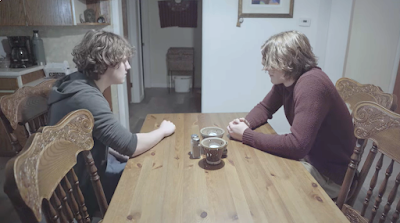a confession
by Douglas Messerli
Nathan Kornick (screenwriter and director) Stay / 2024 [9.25
minutes]
The death of a loved one, and particularly when it’s
a member of one’s family—someone with you’ve lived for so many years—is always
a very personal thing, the emotions that surround it are part of a swirl of not
only love, but anger, joy, hate, peace, and forgiveness that happen when one
lives many years with anyone as a brother, sister, father, mother, and various
other familial roles.
And that
set of personal feeling is nearly impossible to properly communicate, as this
film reveals. It is hard for any of us to comprehend why the young man central
to this work, Andrew (Gabe Malek) is still so obsessed with his older brother’s
death, a man who had retreated to a hospice as he was dying of cancer.
Obviously, he also feels great guilt, even after visiting his brother
several times—particularly when his brother thanks him for all the visits—for
not having stayed instead of returning to where his lover was living. The guilt
seems all out to proportion to his decision.
I too,
caring almost single-handedly for my dying, father finally had to return home
(he living in Iowa, I in Los Angeles), and he died within the next week. Yet I
feel no deep remorse for having done what I had to do; there were business
matters and my lover waiting at the other end. Moreover, I had a brother and
sister who had refused, because of their own deep love of my father, to be
around him as he was dying. My sister finally came to replace me in my absence,
my brother, who perhaps loved my father the deepest of the three of us, simply
could not manage to remain in the room with the man he saw dying.
It would
be nearly impossible, accordingly, to judge this film on what might first
appear to be a minor and necessary decision, leaving his brother instead of
remaining to see him into death, an act that perhaps even the brother might
have approved of.
Yet it
might have helped us if screenwriter and director Kornick could have presented
us with more information about how the brothers had related to one another
throughout their lives. Had they always been close? Were there other reasons
for Andrew to feel guilty about his leaving. Did Andrew’s homosexuality—he
tells this story to his companion Michael (Marin Masar) who has failed to even
remember that the day represented the third year after his brother’s death—have
any impact upon their relationship? Where were the boy’s parents during all of
this and what was their relationship with their boys like? Had they abandoned
their dying son? Or had they previously died?
The
questions unspoken are nearly endless. And we find it, accordingly, nearly
impossible to share in Andrew’s sorrow. We simply don’t have the links of
emotional feeling to even comprehend his sense of guilt and overwhelming
sorrow.
These
issues, moreover, are not helped by a vague visual presentation of the two
central characters, both of whose hair seems often cover their faces and are
represented in a milky white light that makes them both seem nearly lifeless,
as if they too were phantoms possessed by the problems of the past.
One
might have comprehended the director’s decisions (no crew is listed for these
roles) about light and makeup; perhaps he chose to show them in their own
hidden worlds, as unknowable as real persons as their individual emotional
responses. But without real or at least a simulacrum of a fully real person we
feel as viewers even less inclined to explore these highly personal reactions
to a now fairly long-ago death.
In
short, Stay certainly may mean well in its exploration of how the
circumstances of a death in the family effect an individual; but without fully
engaging it viewers, Andrew’s words fall on deaf ears, his tears don’t fully
move our hearts. Who is this unhappy young man for whom evidently no one showed
up to hear his third-year eulogy? And we certainly cannot blame the finally
endlessly patient Michael for having failed to memorialize his lover’s painful
day. He has done the best he can, in the end, by simply hearing out his
partner’s confession. Can some one performing as a priest ever fully comprehend
the personal guilt of the confessor? How then can he fully provide forgiveness,
assign any contrition?
The
role of the viewer of Kornick’s film is asked to play has very few clues about
how to interpret and explain the confessor’s painful guilt.
Los Angeles, July 6, 2025
Reprinted from My Queer Cinema blog (July
2025).



No comments:
Post a Comment